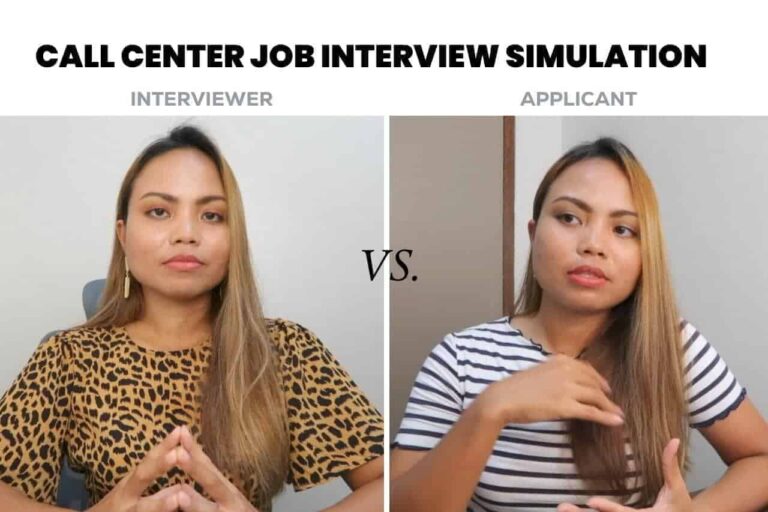Whether you’re applying in sales or in customer service, expect to hear Sell me this pen during your call center job interview. In this article, you’ll learn the best way to answer this question along with some sample answers.
Table of Contents
Why interviewers ask this question
Interviewers ask this question to gauge your selling skills. You see, whether you’re working in sales or not, you’re actually selling all the time.
When you’re in customer service, you’re selling the idea that you’re an expert, that you know what you’re talking about; when half the time, you don’t.
When you’re sitting in a job interview, you’re selling the idea that you’re one of the best people for the job. When you’re watching my videos, I’m selling you the idea I know that I know something you don’t, that you should listen to me, and that I’m an expert; when really, the ideas that I share with you aren’t originally mine.
So you see, knowing how to sell is crucial whichever field you’re on. It makes you look competent, confident, and persuasive. Therefore, expect to hear this question a lot in a call center job interview.
How to Answer “Sell Me This Pen”
Most applicants answer this question by highlighting the pen’s features and benefits.
Applicant: This pen is not just a pen. It’s multi-purpose and also functions as a flashlight and a taser. With this, you can write as well as feel safe 24/7.
Interviewer: That sounds cool but… you see, I don’t really like pens with multipurpose features. I know that sounds weird but I find them extremely tacky. I need a pen to be just a pen. No extra bells and whistles. If I need a taser and a flashlight, I’ll buy them myself.
Big mistake. The problem with this is, you’re making assumptions. Just because the added taser and flashlight sound cool to you, doesn’t mean that the interviewer feels the same.
The ending? Instead of selling the pen, you’ll end up arguing with her about what makes a pen cool. You’ll be basically telling her that she’s wrong for wanting a stand-alone pen. Not a great start if you want her to buy.
Here’s what you should be doing instead:
Step 1: Ask questions FIRST!
You can talk about the mind-blowing benefits and features but they won’t mean anything to your interviewer if they’re not exactly what she’s looking for.
Instead, what you should be doing is ask her questions about what she needs from a pen. By asking questions first, you’ll be able to pinpoint the interviewer’s specific needs.
- How often do you use a pen?
- How many pens do you own?
- What do you usually use it for?
- What are the things that annoy you when using a pen?
Note: You don’t need to ask these exact questions. Whatever questions you ask, make sure they’ll help identify your interviewer’s wants and needs.
Step 2: Create features that fill your interviewer’s needs.
Once you figure out your interviewer’s wants and needs, it’s time to build a feature around them. This way, you won’t have a hard time selling the pen because it’s something that your interviewer specifically wants and needs.
Sample answer #1
Interviewer: Sell me this pen.
You: Sure. I’d like to know, how many pens do you own?
Interviewer: A dozen.
You: Wow, that many huh? Is there a reason why you need that many?
Interviewer: (chuckles) Well, technically, I could survive with only one but I have this annoying habit of losing a pen on a regular basis.
You: On estimate, how many pens do you buy per month?
Interviewer: Well, I wasn’t counting but I’m sure not a week goes by that I don’t lose at least one. So on estimate per month, I replace around 4 pens. And oh, make that 6 because sometimes, some of the inks dry up.
You: How much does each pen cost?
Interviewer: 10 pesos each. I choose the cheap ones so I can buy them in bulk.
You: Stephanie, what would you say if I tell you that from this day forward you’ll never again lose a pen in your life, nor spend an outrageous amount of money on unreliable pens?
Interviewer: Hmmm, is that so?
You: You see this pen right here? This is not an ordinary pen. This pen is equipped with a flawless ink flow that never dries up. What’s more, this has a built-in tracker.
Interviewer: Really? How does the tracker work?
You: All you have to do is download an app and connect this pen to your phone. Once connected, you’ll be able to track the live location of your pen 24/7.
Interviewer: Interesting. How much does it cost?
You: You can get this for only 500 pesos.
And I know what you’re thinking, “Too expensive.” But if you do the Math, this pen is actually 4.3 times cheaper. You spend 60 pesos per month on average, right? Well, the ink of this pen lasts up to 3 years. With your usual supply of cheap pens, you’ll end up spending ₱2,160 in 3 years. With this pen, you only spend ₱500. Why pay too much for unreliable pens?
Interviewer: Now you really intrigue me. But what if I forget the pen at home? Even if I have a tracker, I still wouldn’t want to go back home just for a pen, you know.
You: Easy, you have two options: Either you activate the notification of the app to notify you when the pen is 3 meters away from you. Or you can buy two. One for the office and one at home if you really need that extra security. You’ll still save a lot, mind you. But you see, one really is enough. This pen is equivalent to your 3-year worth of pen supply.
Interviewer: Excellent! I’ll get it.
The purpose of asking the questions is to identify two things: needs and wants. If you can identify a need to fill, then that’s a great reason to sell.
There are, however, times when there seems to be no need to fill – when the potential buyer seems to be satisfied with just how things are and don’t see the need to buy a new product. In that case, you need to look for wants. See this second sample answer:
Sample answer #2
Interviewer: Sell me this pen.
You: Tell me, how often do you use a pen?
Interviewer: Every day.
You: What do you use it for?
Interviewer: I use it at work to mark resumes mostly, signing everyday papers, nothing special really, just everyday tasks. And I also write in my journal.
You: Oh so you write journals? Do you do it often?
Interviewer: Every day, yes.
You: You know, that’s pretty rare for someone to be consistent with journaling. Lots of people want to develop the habit but they eventually fall out of it. What keeps you going?
Interviewer: It helps me keep track of my goals. When I write my goals down on paper, there’s a greater chance of me achieving them based on experience. Besides, it’s a great way to preserve the memories I want to look back on someday.
You: I assume you have a special notebook for your journal?
Interviewer: Yes, I do.
You: Do you use a special pen, too?
Interviewer: Not really. The pen I use at work every day, I use in my journal, too.
You: So let me get this clear, you have a special notebook for your special journal but not a special pen. Why?
Interviewer: (shrugs) I never really thought about it. It does the job and it writes okay.
You: Well, Heather, wouldn’t you say that journaling is a pretty special part of your day? Then it should be treated like one. What I mean is, here you are, writing about the happiest moments of your life, the most important goals you plan to accomplish in the next 5 years, on a special notebook, but with a very unmemorable pen?
I get it. It gets the job done. But wouldn’t you say that your goals, ideas, and memories deserve something more special than an everyday pen?
This is the pen for preserving your most cherished memories, your ideas, your lightbulb moments, your biggest goals. This is the tool you use to mark your progress in life.
Think of it as a symbol for your growth. When you begin using the special tool, you are in a more productive state of mind, and you begin to accomplish more goals and cherish each memory more intensely.
Interviewer: You have a point. But what makes it so special?
You: This is the only pen in the world with this exact design. When you buy a pen from me, I guarantee that it’s customized for you and you alone. And from what I see, you’re a person who is focused on self-growth and progress. And this pen is the perfect one for you.
In this example, the potential buyer was satisfied with the way things were until the salesperson pointed out that she could have something better. No need to fill, yet there was a want waiting to be discovered.
Sample answer #3
If you want a simple and short answer, simply ask yourself this question: What’s the number one thing that annoys you when using a pen?
Once you hear the answer, simply create a feature that solves that problem.
Interviewer: Sell me this pen.
You: Tell me, what’s the number one thing that annoys you the most when using a pen?
Interviewer: I hate the fact that I can’t erase anything when I write with a pen. I’d have preferred to use a pencil but of course, that’s out of the question. So I don’t really have a choice.
You: Does the appearance of the pen matter to you? Does it have to have a certain design, color, or look?
Interviewer: I honestly don’t care how it looks like as long as I can rely on it 24/7. That, and the ability to erase typos.
You: You know, Jen, I have the perfect pen for you. Based on what you just said, this pen matches everything you need from a pen.
This pen is equipped with an eraser. That’s right! An eraser. But note, this is not a pencil. Think of this as a breed between a pen and a pencil. It has the high definition ink of a pen but with the capacity to erase typos like a pencil.
When it comes to reliability, well, our company has been in the business selling pens for two centuries now. We would never survive this long without prioritizing the quality of our pens.
Things to remember
- This is not a typical job interview question
This not an interview question that you answer once or twice and then the interviewer moves on to another question. This more like a lengthy exchange between you and your interviewer.
- This can’t be 100% scripted.
You can plan which questions to ask initially but a big part of your conversation is going to be spontaneous and impromptu. So practice with a friend and ask your friend to come up with a different answer each time you ask her the initial questions. This way, you can practice being spontaneous with your questions and responses.
- Expect rebuttals.
While you can avoid difficult rebuttals by asking questions firsthand, expect to still hear them from your interviewer. That’s normal. Therefore, when practicing, ask your partner to also throw in some rebuttals and contradictions. This will make your practice more realistic.
- Expect questions.
When the interviewer asks for more info about your pen, that’s usually a good sign. It means you’re piquing her interest. When practicing with your partner, tell her to ask questions, too.
- Know that you’re controlling the conversation
With this type of question, you need to be the one taking control of the conversation. After all, you’re the salesperson. By asking questions, you’re taking the steering wheel from your interviewer while she’s taking the more passive role in the backseat by answering your questions.
You Might Also Like:
- How to Improve Your English for Call Center: Tip #1
- Useful Call Center Jargons Newbies Must Know To Survive
- Describe a Color to a Blind Person: BPO Sample Answers
- What Are Your Strengths? Call Center Job Interview Answers
- What is Your Greatest Weakness? Call Center Job Interview
- How to Answer Why do You Want to Work in a Call Center?





